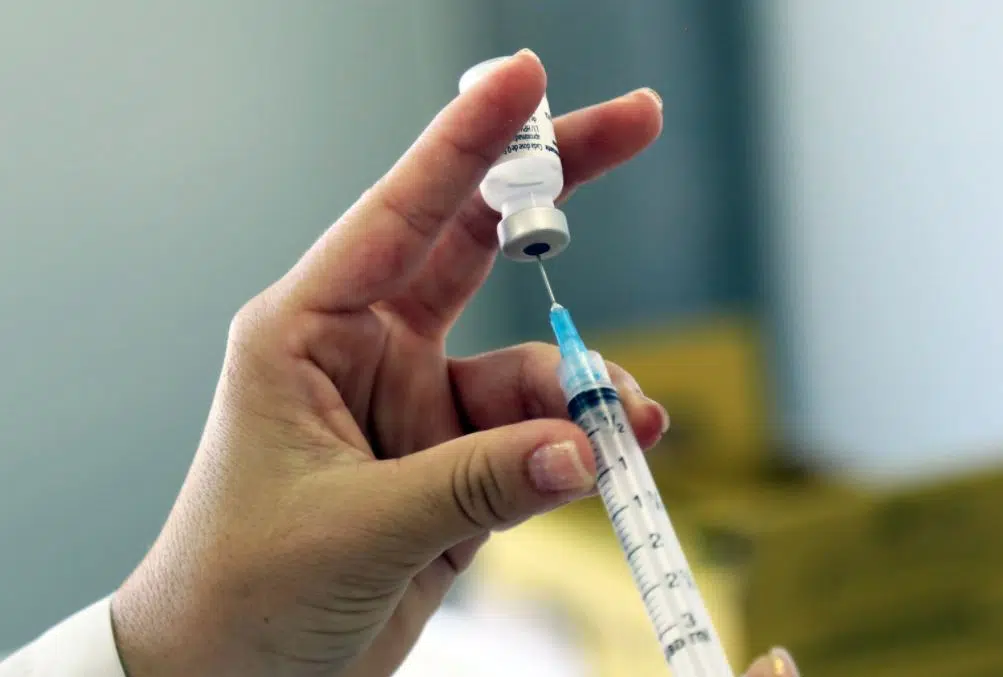
B.C. health officials plan to immunize 400,000 people against COVID-19 by March 2021, with residents and staff of long-term care homes among the first people to get immunized.
Provincial Health Officer, Dr. Bonnie Henry, says it will save lives and stop the health-care system from becoming overwhelmed, but cautions that level of immunity will not stop the pandemic, urging people to keep up with measures like physical distancing and the use of masks.
“Today is an important day for everyone in British Columbia. Today we are talking about COVID-19 vaccines, vaccines that are real and approved for use here and across the country,” she said, noting the immunization program will be the ‘most complex’ in the province’s history.
In all, the province will be getting 3,900 doses of the Pfizer vaccine early next week on four trays, each with 975 doses of the vaccine. Two trays each will go directly to two undisclosed vaccine delivery sites at health care facilities – one in Vancouver Coastal Health and the other in Fraser Health.
Henry says these vaccines have to be administered at the place it is delivered, so they won’t be able to immunize long term care home residents at first, though she’s hoping that can happen in a week or two. It means the first round of vaccinations will be given to health-care workers who can go to one of those two sites.
In all, there are expected to be nine such vaccination sites by January, though there are plans to have 30 across British Columbia sometime next year.
The province expects to begin immunizations by next week after the Pfizer vaccine was approved by Health Canada earlier today. People will need to get two doses of the vaccine to be fully protected, with the second dose coming a minimum of 21 days after the first dose.
People will begin achieve immunity seven days after the second dose, though immunity is increased after the first dose, Henry noted, adding it remains to be seen how long the immunity will last for.
Vaccine Roll Out Plans
Up to 249,000 doses of the Pfizer vaccine are expected to arrive in Canada by the end of the year, with ‘tens of thousands’ coming to British Columbia.
Once more doses are available, Dr. Henry says the province will be vaccinating people over the age of 80, people with underlying health conditions, homeless people, and those living in remote and isolated Indigenous communities.
“Our plan is built to be flexible. There will be likely be some hiccups. We will respond to the circumstances at the time,” said Henry. “There is light ahead, and that light is shining a little brighter today.”
Later on in the spring, once more vaccines are available, other health care workers will be able to get immunized, as well as first responders, and essential workers in places like grocery stores and food packing plants, followed by vaccinations based on a person’s age and risk factors.
“The reality is we have limited doses of the vaccine. The other reality is we are not seeing firefighters being exposed, we are not seeing teachers exposed,” Henry said, when asked why homeless people were high on the priority list.
“We are focusing on saving lives and those are the people most likely to get ill and end up in hospital.”
Henry noted the Pfizer vaccine has not be approved for use for everyone, noting the effects on children under the age of 16, pregnant women, and people with immunocompromised conditions are not yet known.
“That is something that we are looking at because we know that people whose immune systems are not functioning are at more risk of having severe illness from COVID-19,” Henry said. “Unfortunately, we do not yet know if these vaccines work in people who are immunocompromised and if they’re safe.”
“Each vaccine maker had to show that vaccines were safe, effective and administered to highest quality. We set the bar high,” added Henry. “I have full confidence in the vaccines and the processes that have taken us to this point right now.”
Moderna Vaccine to Come Soon: Dr. Henry
Dr. Henry also noted that the Moderna vaccine is likely to be the second vaccine approved for use in Canada, with the approval expected soon.
Like the Pfizer vaccine, it too requires two doses for full protection as both vaccines use messenger RNA technology, and contain the genetic coding for the virus’s spike protein which teaches a human body’s immune system to recognize the spike protein to prevent infection against COVID-19.
Health officials are urging patience noting people will be eager to see when they will be in line to get vaccinated against COVID-19.
“Eventually, everyone who can and wants to get a vaccine will get access. This will not happen right away. We need to continue to take measures to protect one another,” Henry said, having previously said that she expects to have everyone in the province who wants a COVID-19 vaccine to be able get it by Sept. 2021.
The Moderna vaccine is easier to transport as it does not require temperatures of -70 C like the Pfizer vaccine. Henry expects that vaccine to be more readily available to immunize long term care home residents who won’t be able to go to vaccine delivery sites across the province.
Speaking today, Premier John Horgan noted that after 10 months of hardship, isolation, and loss, people have a reason to be optimistic with vaccines on the horizon, calling it a glimmer of hope.
“Although the end is not in front of us, the beginning of the end may well be,” he said. “As we see an increase in supply we’re going to see an increase in optimism and an increase in opportunities for us to get back to what is remotely resembling normal.”













